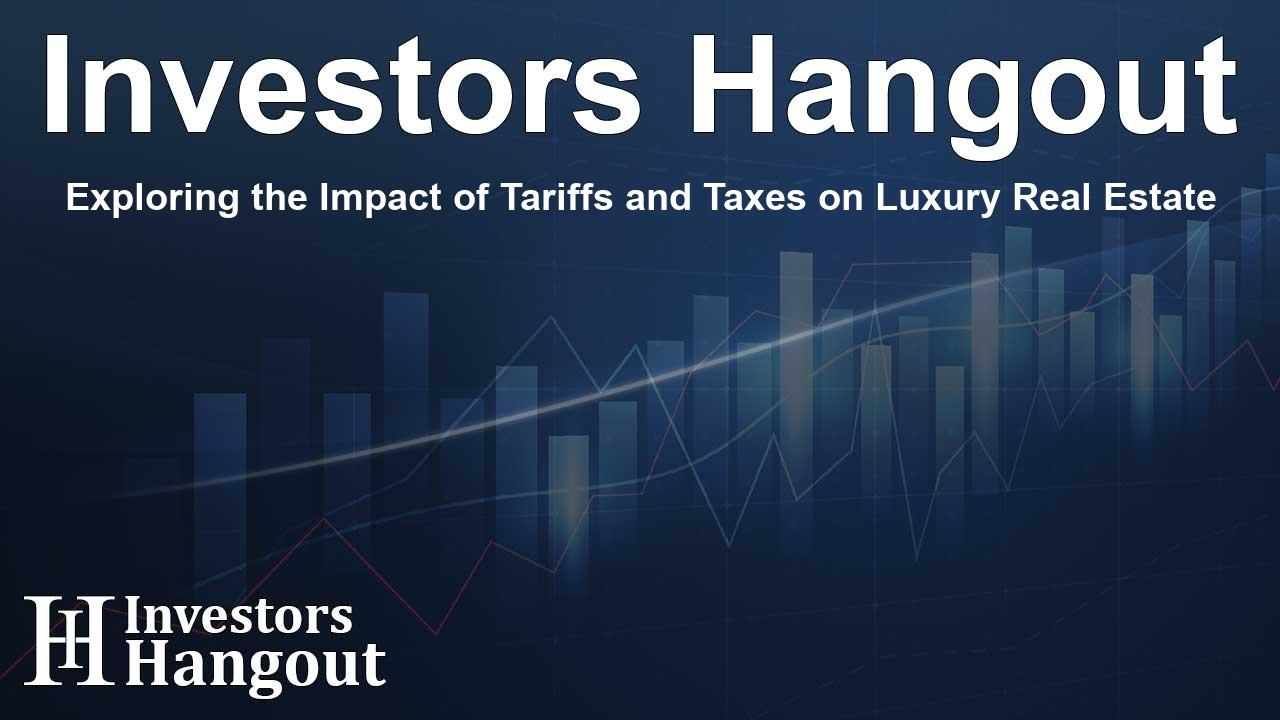Exploring the Impact of Tariffs and Taxes on Luxury Real Estate

The Shifting Landscape of Luxury Real Estate
The luxury real estate market faces an uncertain future as political candidates propose varying approaches to economic policy. As the political landscape evolves, industry experts are closely monitoring how these potential shifts can affect high-end properties and affluent investors.
Campaign Promises and Their Consequences
Both political figures convey intentions of tackling housing affordability, yet their strategies diverge significantly. Understanding these proposed changes is essential for those involved in luxury real estate. The promise to address supply issues might not directly benefit luxury property sectors, where affluent buyers are more attuned to broader economic trends.
Trump's Tariffs: What It Means for the Market
Trump’s proposed tariffs, especially a hefty levy on imports such as those from China, cast a shadow on the luxury real estate sector. Jonathan Miller, a real estate appraisal expert, articulates concerns that higher tariffs might exacerbate inflation and negatively influence financial markets. Wealthy investors heavily focus on market health, and any turbulence can prompt shifts in buying behaviors amongst the affluent.
Potential Taxation Changes Under Harris
On the taxation front, Harris's proposals could introduce challenges. Her idea to increase the capital gains tax may turn away some luxury property sellers. Property expert Lance Lambert highlights that the ramifications primarily target wealthier property owners. This might reduce activity in the deluxe real estate market and could affect the income of agents specializing in high-end properties.
Analyzing Tax Deductions
Interestingly, Trump's policies surrounding the state and local tax (SALT) deduction could provide some advantages for luxury homeowners. By potentially lifting the $10,000 SALT cap, he could attract more affluent buyers, enhancing interest in luxury real estate. Ralph McLaughlin notes that these changes would benefit existing homeowners while possibly bringing new buyers to the market.
Uncertain Supply Dynamics
Both candidates also delve into opening federal lands for development, a move showcasing their commitment to addressing housing shortages. However, this could lead to competition for desirable locations, often appealing to wealthier clients. As noted by McLaughlin, without guidelines, luxury developers could prioritize picturesque areas, influencing market dynamics further.
Long-Term Investor Sentiments
Despite the complexity surrounding these proposals, investor sentiment remains firm. Many wealthy investors still prioritize the economic outlook when casting their votes. Recent reports indicate that a significant percentage of these investors view economic policies as crucial, demonstrating the weight these discussions hold in shaping their decisions.
Market Realities and the Importance of Narrative
Bess Freedman, CEO of Brown Harris Stevens, aptly points out how political narratives could deter potential property buyers. The portrayal of cities could shape decisions significantly, regardless of actual safety or aesthetic qualities. Such narratives can heavily influence perceptions of neighborhoods and overall real estate desirability.
Final Thoughts on the Future of Luxury Real Estate
As the luxury market navigates the potential ramifications of tariffs and taxes, the stakes are high. Whether leaning towards Trump’s tariffs or Harris's tax proposals, stakeholders must remain alert to how these political maneuvers will shape industry landscapes in the years to come.
Frequently Asked Questions
How might Trump's tariffs impact the luxury real estate market?
Trump's tariffs could lead to increased inflation, negatively affecting high-end properties as affluent buyers might rethink their investments in response to economic fluctuations.
What are Harris's tax proposals for luxury homeowners?
Harris's proposed increase in capital gains tax may result in fewer wealthier individuals selling their luxury properties, thus impacting the overall market activity.
Could Trump's changes to SALT deductions benefit luxury buyers?
Yes, lifting the SALT cap could potentially attract more wealthy buyers into the luxury real estate sector, enhancing interest among high-income earners.
What role does narrative play in the luxury real estate market?
The narratives constructed around cities greatly influence buyer perceptions, affecting their likelihood to invest in certain areas based on safety and desirability.
How do investor sentiments reflect on election outcomes?
Investor sentiment is a strong indicator of election outcomes, particularly their views on economic policies, which can determine their support for political candidates.
About Investors Hangout
Investors Hangout is a leading online stock forum for financial discussion and learning, offering a wide range of free tools and resources. It draws in traders of all levels, who exchange market knowledge, investigate trading tactics, and keep an eye on industry developments in real time. Featuring financial articles, stock message boards, quotes, charts, company profiles, and live news updates. Through cooperative learning and a wealth of informational resources, it helps users from novices creating their first portfolios to experts honing their techniques. Join Investors Hangout today: https://investorshangout.com/
Disclaimer: The content of this article is solely for general informational purposes only; it does not represent legal, financial, or investment advice. Investors Hangout does not offer financial advice; the author is not a licensed financial advisor. Consult a qualified advisor before making any financial or investment decisions based on this article. The author's interpretation of publicly available data shapes the opinions presented here; as a result, they should not be taken as advice to purchase, sell, or hold any securities mentioned or any other investments. The author does not guarantee the accuracy, completeness, or timeliness of any material, providing it "as is." Information and market conditions may change; past performance is not indicative of future outcomes. If any of the material offered here is inaccurate, please contact us for corrections.